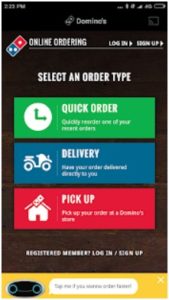Does my business need an app?

With the proliferation of businesses that are enhancing their value proposition with mobile applications, it's starting to look like having a mobile app is becoming a requirement to survive the digital era.
Think back to the early 2000's... many businesses were still asking the question "does my business need a website?". Now days, that's not a question; it's a given. Will the same thing happen with mobile apps?
Perhaps your website is performing well, and it seems like everything is going as it always has. The old methods are still working today. But will that last? And do you want to wait until you need to change, or would you like to stay ahead of the curve?
Digital Transformation is the strategic response to changes in customers and their perceptions of value, in the digital era. Many businesses have successfully innovated and transforming their existing business model to be more compatible with that of today and the future. And of course, there are plenty of examples of businesses that have failed to respond.
But will your business need to change?
The only sensible answer here is "yes".
The need to be constantly searching for opportunities to add value to customers is more relevant today than ever before, regardless of the industry. We cannot expect that businesses that are founded on values that were set 10 years ago, or even just 5 years ago, to continue to be relevant today and tomorrow, even if they have worked well all this time.
So if you're of the belief that your industry won't change, and that you don't need to think ahead and prepare to respond, then you may as well return to your business-as-usual. But before you do, take a moment to reflect on the thousands of businesses that have fallen...
Now that we know that your business probably needs to consider change, will an app help?
If an app is added to a business out of a sense of obligation to "keep up with the times" then it will probably do more harm that good.
- The costs and time investment of development may not bring a return on investment, meaning the business suffers an avoidable loss of resource.
- Failure to succeed would likely incur intangible damage to the brand, and send an indication that the business may be "struggling to survive"
- If the app doesn't improve the customers experience, then it worsens the experience, which may prompt existing customers to seek alternative options.
However, when done in a way that genuinely and positively augments or transforms the customers experience, then the answer is almost certainly "yes". Apps can open new revenue streams, new methods of engagement, and promote customer loyalty.
Ultimately, apps have the potential to truly transform a business. However, the outcome of that transformation depends on the strategy, before the technology.
So, the correct question to be asking here is the:
How could an app help my business?
The profile of the customer has changed significantly over the past decade. Social networks and customer-centric digital businesses have changed many existing problems, have influenced the way customers go about solving their problems, and have shifted customer perceptions of value and expectations from businesses.
Therefore, answering this question requires the focus of thought to step back, and focus on the customers role in the business model.
It requires reviewing the problem, solution, customers, channels, and revenue, and for each dimension of business, considering:
- What has changed recently?
- What could change in the near future?
- What new opportunities do or may exist?
And in doing so, consider that the modern customer expects businesses to behave in ways that only several years ago were considered innovative. Specifically, they expect businesses to be accessible (e.g., via mobile app, Facebook, any day/time), engaging, and offer custom and flexible services.
It is in these "sweet-spots' that mobile applications can offer value to a business.
Of course, the decision to include an app should be the end result of a robust revision of the businesses strategy, not the other way around. Businesses need to be careful to not fall in a technology-first mindset.
However, acknowledging that an app may be needed, even if at a very speculative level, is a positive indication that it's time to review the business model.
In future posts I'll introduce some frameworks to help bridge the gap between business strategy and digital strategies, to help you understand and conquer your own digital transformation.
My leaving note:
An app is not a strategy; it is a tool that enables a strategy to be effectively implemented.
Before wrapping this post-up, I'd like to share a couple examples of traditional businesses that have transformed their value offering with the help of applications.
1. Domino's Pizza
 The pizza delivery business have it roots firmly in the pre-digital era, based on phone orders and delivery or pick-up. However, in response to shifts in customer expectations and values (particularly of accessibility and ease of use), they have created a couple of mobile applications that augment the user experience. For many users, this functionality would provide the competitive advantage over traditional pizza suppliers.
The pizza delivery business have it roots firmly in the pre-digital era, based on phone orders and delivery or pick-up. However, in response to shifts in customer expectations and values (particularly of accessibility and ease of use), they have created a couple of mobile applications that augment the user experience. For many users, this functionality would provide the competitive advantage over traditional pizza suppliers.
Want a Domino’s store in your pocket, anywhere, anytime? Now you can with the Domino’s app!
See it on the Play Store
2. NZ Herald
 The printing and distribution of news content is a business model that has been around for centuries. The first printed weekly newspapers were distributed in the early 17th century. However, the expectations of customers have changes and the model to purchasing a physical paper from a news stand no longer appeals to a large proportion of existing customers, and would certainly pose a barrier to gaining new, younger, customers. In response, news publishers like The Herald now make their news stories available via mobile applications, to not only assure their brand and position as a contemporary news distributor is maintained, but to transform the experience of the user, enabling them to share stories and view photo galleries in full screen.
The printing and distribution of news content is a business model that has been around for centuries. The first printed weekly newspapers were distributed in the early 17th century. However, the expectations of customers have changes and the model to purchasing a physical paper from a news stand no longer appeals to a large proportion of existing customers, and would certainly pose a barrier to gaining new, younger, customers. In response, news publishers like The Herald now make their news stories available via mobile applications, to not only assure their brand and position as a contemporary news distributor is maintained, but to transform the experience of the user, enabling them to share stories and view photo galleries in full screen.
Welcome to the New Zealand Herald Android app, designed to deliver the latest and most relevant news to you in the best way possible. Access the very latest in news, sports and entertainment from our award-winning journalists, plus specialist content from Viva.co.nz, Driven.co.nz, Spy.co.nz, Bite.co.nz, WatchMe.co.nz and other sites within the NZME. network - all at your fingertips, wherever you are.
View on the Play Store.
I hope this post has been help and has provided some perspective on the thought process that precedes the development of an application for a business.
Do you have any examples of businesses that have transformed with the help of a well-planned app? Or businesses that have brought in an app just because they were attempting to keep up?
TAGS: